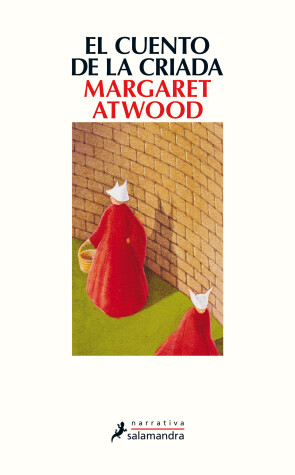
mitabird
Written on Mar 23, 2014

Bookhype may earn a small commission from qualifying purchases. Full disclosure.
BESTSELLER DEL NEW YORK TIMES * RECOMENDADO POR JENNA BUSH EN SU CLUB DE LECTURA DEL TODAY SHOW Y EN SU PODCAST READ WITH JENNA
El libro en que se basa la serie de hulu.
El libro de cabecera de una nueva generación.
Amparándose en la coartada del terrorismo islámico, unos políticos teócratas se hacen con el poder y, como primera medida, suprimen la libertad de prensa y los derechos de las mujeres. Esta trama, inquietante y oscura, que bien podría encontrarse en cualquier obra actual, pertenece en realidad a esta novela escrita por Margaret Atwood a principios de los ochenta, en la que la afamada autora canadiense anticipó con llamativa premonición una amenaza latente en el mundo de hoy.
En la República de Gilead, el cuerpo de Defred sólo sirve para procrear, tal como imponen las férreas normas establecidas por la dictadura puritana que domina el país. Si Defred se rebela -o si, aceptando colaborar a regañadientes, no es capaz de concebir- le espera la muerte en ejecución pública o el destierro a unas Colonias en las que sucumbirá a la polución de los residuos tóxicos. Así, el régimen controla con mano de hierro hasta los más ínfimos detalles de la vida de las mujeres: su alimentación, su indumentaria, incluso su actividad sexual. Pero nadie, ni siquiera un gobierno despótico parapetado tras el supuesto mandato de un dios todopoderoso, puede gobernar el pensamiento de una persona. Y mucho menos su deseo.
Los peligros inherentes a mezclar religión y política; el empeño de todo poder absoluto en someter a las mujeres como paso conducente a sojuzgar a toda la población; la fuerza incontenible del deseo como elemento transgresor: son tan sólo una muestra de los temas que aborda este relato desgarrador, aderezado con el sutil sarcasmo que constituye la seña de identidad de Margaret Atwood. Una escritora universal que, con el paso del tiempo, no deja de asombrarnos con la lucidez de sus ideas y la potencia de su prosa.
ENGLISH DESCRIPTION
#1 NEW YORK TIMES BESTSELLER • READ WITH JENNA BOOK CLUB PICK AS FEATURED ON TODAY • RECOMMENDED ON THE 'READ WITH JENNA' PODCAST•
Look for The Testaments, the sequel to The Handmaid’s Tale, available now.
An instant classic and eerily prescient cultural phenomenon, from “the patron saint of feminist dystopian fiction” (New York Times).
Now an award-winning Hulu series starring Elizabeth Moss.
In Margaret Atwood’s dystopian future, environmental disasters and declining birthrates have led to a Second American Civil War. The result is the rise of the Republic of Gilead, a totalitarian regime that enforces rigid social roles and enslaves the few remaining fertile women. Offred is one of these, a Handmaid bound to produce children for one of Gilead’s commanders. Deprived of her husband, her child, her freedom, and even her own name, Offred clings to her memories and her will to survive. At once a scathing satire, an ominous warning, and a tour de force of narrative suspense, The Handmaid’s Tale is a modern classic.


We lived, as usual, by ignoring. Ignoring isn't the same as ignorance, you have to work for it. Nothing changes instantaneously: in a gradually heating bathtub you'd be boiled to death if you knew it.[b:The Handmaid's Tale|38447|The Handmaid's Tale|Margaret Atwood|https://images.gr-assets.com/books/1498057733s/38447.jpg|1119185] by [a:Margaret Atwood|3472|Margaret Atwood|https://images.gr-assets.com/authors/1282859073p2/3472.jpg] is an incredibly smart critique and satire on religious fundamentalism taken to an even greater extreme. The novel itself is unsettling as a result of being written in the present tense, so that while reading I was on edge that at any moment something could happen to the narrator and the story would end abruptly. The style of writing set the tone for the dangerous world of Gilead, but the most disturbing element of the novel was the religious fundamentalism itself. Gilead obviously took a literal interpretation of the Bible as second marriages were outlawed, and “be fruitful and multiply” led to placing reproduction to be the primary goal for the society of Gilead. As a woman, I was most shocked by the objectification of women to be little more than baby makers, and that a woman’s worth is solely based on her ability to reproduce: “I want to be valued, in ways that I am not; I want to be more than valuable."
I would like to believe the story I'm telling. I need to believe it. I must believe it. Those who can believe that such stories are only stories have a better chance. If it's a story I'm telling, then I have control over the ending."The book is told in Offred's stream-of-consciousness point of view in her mind, a reconstruction of her past. There are times in her narrative where she says "this isn't how it happened," in brief glimpses of humor in even the darkest of circumstances. I read the book feeling like I was inside her mind listening to her thoughts, something that is reinforced by Atwood's writing style and the omission of quotation marks.
There is more than one kind of freedom, said Aunt Lydia. Freedom to and freedom from. In the days of anarchy, it was freedom to. Now you are being given freedom from.This is my fourth time reading The Handmaid's Tale and each time it impresses me in different ways; this time was particularly jarring considering the current political climate in the United States and how desensitized we are to everything going on around us. This book is horrifying, casting a light on the darkest parts of society. It is beautifully written and heart wrenching, and I recommend that everyone reads it. And then watches the television series because it is also brilliant.
Better never means better for everyone, he says. It always means worse, for some.





